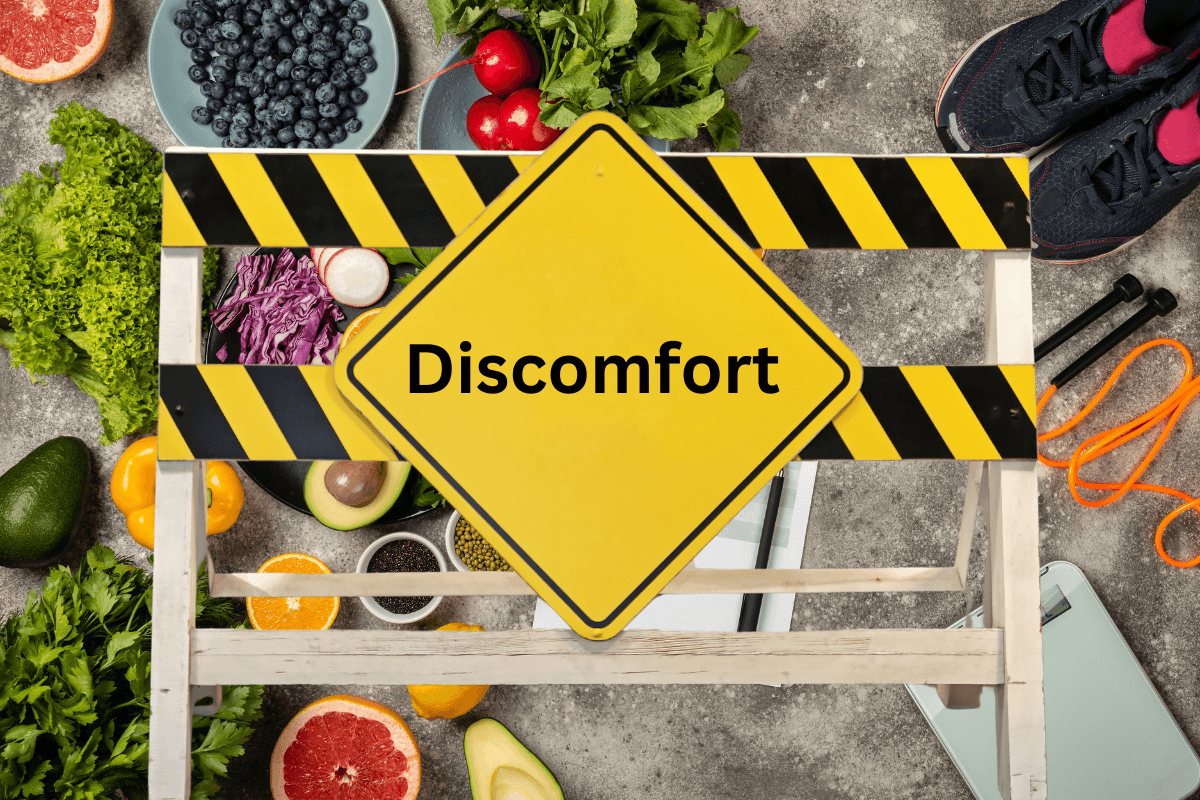Discomfort Intolerance: The Hidden Barrier to Weight Loss and Healthy Habits

When people struggle to lose weight or maintain healthy habits, they often assume it's due to a lack of willpower, motivation, or knowledge. But there’s a lesser-known factor at play: discomfort intolerance—the tendency to avoid or escape from any form of discomfort, whether physical, emotional, or psychological.
Discomfort intolerance isn’t just about being “weak” or “lazy.” It’s a learned response shaped by modern convenience, instant gratification, and the way our brains are wired to seek pleasure and avoid pain. If you find yourself struggling to stick with healthy changes, understanding and overcoming discomfort intolerance may be the missing key.
What Is Discomfort Intolerance?
Discomfort intolerance is the inability (or unwillingness) to tolerate temporary discomfort in pursuit of a long-term goal. It shows up in many ways:
Emotional discomfort – The stress of craving food, feeling deprived, or being frustrated by slow progress.
Physical discomfort – The soreness from exercise, hunger between meals, or adjusting to new sleep patterns.
Mental discomfort – The challenge of meal planning, resisting temptations, or pushing through boredom in a workout.
When discomfort arises, the brain signals you to stop whatever is causing it. This is a survival mechanism—but in a world of constant food availability, digital distractions, and comfort-driven lifestyles, it can work against you.
How Discomfort Intolerance Affects Weight Loss and Healthy Habits
Instant Gratification Wins Over Long-Term Goals We are wired to seek pleasure and avoid pain. If given a choice between eating a salad (which requires effort and doesn’t give an immediate dopamine hit) versus grabbing a fast-food meal (which is easy, pleasurable, and rewarding), many will choose the latter. Learning to tolerate momentary discomfort—such as delaying gratification—helps rewire these habits.
Avoidance of Temporary Hunger or Cravings Many people feel that hunger or cravings are emergencies that must be satisfied immediately. In reality, mild hunger is a normal part of life, and cravings are fleeting. Building tolerance to brief periods of discomfort (instead of immediately reaching for snacks) is a game-changer for weight loss.
Struggle to Push Through Exercise Discomfort Exercise requires effort. The initial discomfort of moving more, feeling out of breath, or experiencing muscle soreness can deter people from sticking with it. But those who reframe this as a sign of progress rather than suffering are more likely to stay consistent.
Resistance to Lifestyle Changes Breaking unhealthy habits—whether it’s reducing sugar, improving sleep, or managing stress—requires adjusting to new routines. At first, these changes can feel frustrating, inconvenient, or even overwhelming. But adapting to discomfort means recognizing that feeling “off” for a while is normal and temporary.
How to Build Discomfort Tolerance
Reframe Discomfort as Growth Instead of viewing discomfort as suffering, see it as a sign of change. Discomfort means you’re challenging old patterns and building resilience.
Practice Small Discomforts Daily
- Delay snacking for 10 minutes to recognize hunger cues. - Take a cold shower to get comfortable with mild discomfort. - Hold a plank for a few seconds longer than feels easy. - Small moments of discomfort build mental toughness over time.
Adopt a “This Is Temporary” Mindset Remind yourself: Discomfort is not permanent. Hunger passes. Soreness fades. Cravings lose power. By viewing discomfort as temporary, you take away its ability to control your choices.
Use Mindfulness and Breathwork Mindfulness techniques help you observe discomfort without immediately reacting to it. Deep breathing, pausing before making choices, and recognizing urges as passing sensations can make a huge difference.
Celebrate Pushing Through Instead of only celebrating results (like weight loss), acknowledge the small wins: skipping a late-night snack, finishing a tough workout, or saying no to an impulse craving. These moments build resilience.Lorem ipsum dolor sit amet
Final Thoughts
Success in weight loss and long-term health will not come by eliminating inevitable discomfort. Achieving new, long-lasting learning habits starts with learning to tolerate and even embrace it discomfort.
By building discomfort tolerance, you create the mental and emotional strength to stick with healthy habits, even when they feel hard. Over time, what once felt uncomfortable becomes second nature, leading to real, lasting change.
Are you ready to stop letting discomfort hold you back from your health and longevity goals? Let’s create a plan together. Book a call with me, and we’ll build a strategy to reframe discomfort, strengthen your mindset, and take sustainable steps toward better health. Click here to schedule your session today.
©️2025 Genuine Glow Welness. All Rights Reserved.



